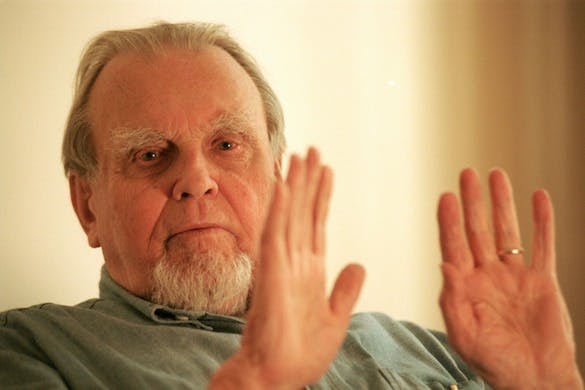Biographies: History Was Exiled Writer Czeslaw Miłosz’s One True Home
Cynthia L. Haven shows how Miłosz — thrilled at an early age to read about the wonders of the wide-open American landscape — situated himself so profoundly in his newfound country’s culture.

“Czesław Miłosz: A California Life”
By Cynthia L. Haven
Heyday, 241 pages
Czesław Miłosz (1911-2004) won the Nobel Prize in 1980 and Joseph Brodsky at the time called him the greatest living poet. Born in Lithuania, renowned in Poland, diplomat for the first Communist regime, Miłosz in 1951 fled the increasing oppression, landing in France and then America. His classic “The Captive Mind” (1953) details how an intellectual like himself had come to serve an inhuman system.
I read that book early enough, as an 18-year-old undergraduate, to never have been seduced by the false promises of collectivism, which I saw firsthand when I later lived as a Fulbrighter in Poland, in 1979-80. Exile was hard on Miłosz — not only because he lost his home audience but because in the West few were much interested in a poet hailing from an Eastern-bloc country dominated by the Soviet Union.
In 1960, he found a berth in Berkeley at the University of California. He bought a home, began publishing in English as well as Polish, and impressed both his colleagues and his students. Except for his first wife, though, no one predicted that he would become the only Nobel Prize winner in literature from his university, or that he would take to California life so adeptly, happy to get one of those parking spots on the Berkeley campus reserved for Nobel laureates.
This is where Cynthia L. Haven comes in, showing how Miłosz — thrilled at an early age to read about the wonders of the wide-open American landscape — situated himself so profoundly in his newfound country’s culture. Not that Miłosz was a Nabokov, writing books like “Lolita.” He saw plenty to criticize in America, especially the lack of a historical consciousness.
The Berkeley radicals of the 1960s exasperated him. He did not question their right to protest, or even that they had a point, but that they lacked all sense of proportion. Here was a writer who had barely escaped the Nazis, and then the communists, and then was welcomed by UC Berkeley, and he was supposed to think that the university was the source of evil?
Miłosz turned to Walt Whitman and to a quintessential California poet, Robinson Jeffers, for solace. Both poets embraced the transfigurations of nature, which could, as Crèvecoeur proclaimed, produce a “new man.” But with his sense of history, Miłosz knew those two writers did not have it quite right. You can’t hack away history the way Americans had hacked away the wilderness. History, as Miłosz said, was, ultimately, his one true home. So his poetry and prose oscillated between the poles of admiring and abjuring contemporary American life.
Ms. Haven grounds this Miłosz pivot between nature and history right into an everyday sense of the way the poet lived, in both solemn and sunny episodes. Here is an example, set during that period when the poet waffled, worried that exile in America might be even worse than in France, where it was hard to find his footing among already established literary stars, or in Poland, where at least he had a following, no matter the efforts of the Communist authorities to muffle him. What to do?
At this critical point in time, Miłosz hesitated, fearing a life without purpose, a life of acedia, the deadly sin he described as “terror in the face of emptiness apathy, depression.” Would he be lost and spiritually compromised in America, with its gaudy automobiles, its relentless advertising, and self-promotion, its Gatsby-like jousting for success? And yet it also had beavers, and dark, silent rivers before dawn.
I hope I’m not the only one to find this passage funny. In fact, it builds on the poet’s early attraction to rivers in Lithuania, and on his testing the American waters in search of what he had read in James Fenimore Cooper. Miłosz found enough of that nature of his imagination in the nature he could look out on from his California home, while never forgetting his history, or the history we ignore at our peril.
California became more than a refuge. It was a vantage point he took with him when he returned in his final years to Poland. Ms. Haven sums up his bifurcation in two sentences: “The phenomenon we know as Czesław Miłosz had to come into being here, had to begin again here so he could fully embrace the world in his time. He had to be here so he could return there.”

